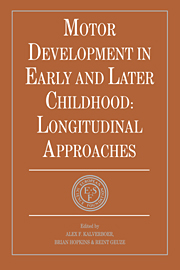Book contents
- Frontmatter
- Contents
- List of contributors
- Foreword
- Preface
- SETTING THE SCENE
- SECTION I BIOLOGICAL BASIS OF MOTOR DEVELOPMENT
- SECTION II DEVELOPMENT OF BODY POSTURE AND GOAL-DIRECTED REACHING
- SECTION III MOTOR DEVELOPMENT, EARLY COMMUNICATION AND COGNITION
- SECTION IV ACQUISITION OF SKILLS
- SECTION V MOTOR DEVELOPMENT AND HANDICAP
- 16 Early motor development in term and preterm children
- 17 Relationship between perinatal risk factors and motor development at the ages of 5 and 9 years
- 18 Motor development and minor handicap
- 19 Longitudinal and cross-sectional approaches in experimental studies in motor development
- SECTION VI METHODOLOGICAL AND CONCEPTUAL CONSIDERATIONS
- Epilogue: description versus explanation
- Index
19 - Longitudinal and cross-sectional approaches in experimental studies in motor development
from SECTION V - MOTOR DEVELOPMENT AND HANDICAP
Published online by Cambridge University Press: 05 May 2010
- Frontmatter
- Contents
- List of contributors
- Foreword
- Preface
- SETTING THE SCENE
- SECTION I BIOLOGICAL BASIS OF MOTOR DEVELOPMENT
- SECTION II DEVELOPMENT OF BODY POSTURE AND GOAL-DIRECTED REACHING
- SECTION III MOTOR DEVELOPMENT, EARLY COMMUNICATION AND COGNITION
- SECTION IV ACQUISITION OF SKILLS
- SECTION V MOTOR DEVELOPMENT AND HANDICAP
- 16 Early motor development in term and preterm children
- 17 Relationship between perinatal risk factors and motor development at the ages of 5 and 9 years
- 18 Motor development and minor handicap
- 19 Longitudinal and cross-sectional approaches in experimental studies in motor development
- SECTION VI METHODOLOGICAL AND CONCEPTUAL CONSIDERATIONS
- Epilogue: description versus explanation
- Index
Summary
INTRODUCTION
In this chapter the value of experimental studies in cross-sectional and longitudinal research of motor development is discussed. This approach is clarified with examples from the study of ‘Motor coordination disorders in children 6 to 17 years of age’. I will refer to these children as clumsy children.
Cross-sectional studies generally are normative or they aim at group comparisons. Longitudinal studies derive their strength from the possibility of analysing developmental data individually. It depends on the goal of the study whether the data are described in terms of individual development or of group development. In the latter case the individual data are averaged, not according to a time reference such as chronological age but according to the occurrence of some important transition in development.
Longitudinal refers to designs which aim to determine individual development of functions by the assessment of transitions and changes in performance over relatively long periods of time. Here it does not refer to designs aimed at measuring the improvement of performance over time in, for example, a task with 1000 trials, with time as a natural independent variable.
Most experimental studies on clumsiness (for a review, see Henderson, Chapter 18, this volume) are based on some model of information processing or movement control. In the processing of task relevant information, this information may be provided externally (for example stimuli) or internally (for example proprioception). The experimental approach is process-oriented. It aims to assess specific functions in information processing that seem to be particularly relevant for motor performance.
- Type
- Chapter
- Information
- Motor Development in Early and Later ChildhoodLongitudinal Approaches, pp. 307 - 316Publisher: Cambridge University PressPrint publication year: 1993



